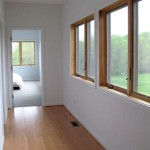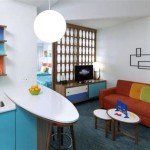Definition: Interior Design
Interior design is a multifaceted profession in which creative and technical solutions are applied within a structure to achieve a built interior environment. These solutions are functional, enhance the quality of life and culture of the occupants, and are aesthetically attractive. Designs are produced in response to the interior design client, are appropriate for the location, and function within the architectural context of the project. Interior design developments and processes adhere to code and regulatory requirements and incorporate principles of sustainability.
The scope of interior design can encompass various elements, from initial space planning and conceptual design to furniture selection, lighting design, and the specification of materials and finishes. It is a discipline deeply rooted in understanding human behavior and psychology, aiming to create spaces that not only look aesthetically pleasing but also contribute to the well-being and productivity of the occupants. This requires a comprehensive understanding of architecture, construction, ergonomics, and decorative arts.
Interior design is often confused with interior decoration, but the two are distinct disciplines. Interior decoration is primarily concerned with the aesthetic adornment of a space, focusing on surface treatments such as paint, wallpaper, and furnishings. Interior design, on the other hand, is a more encompassing field that involves the structural and functional aspects of a building's interior. An interior designer might alter walls, redesign layouts, and incorporate architectural details to improve the overall functionality and flow of a space before even considering decorative elements.
The work of an interior designer requires strong project management skills. They are responsible for coordinating with architects, contractors, and other tradespeople to ensure that the design is executed according to plan, on time, and within budget. This involves creating detailed drawings and specifications, understanding building codes and regulations, and managing the construction process.
Key Point 1: The Core Principles of Interior Design
At the heart of interior design lie several core principles that guide the creation of functional, aesthetically pleasing, and harmonious spaces. These principles include balance, proportion, rhythm, emphasis, and harmony, all working in concert to create a cohesive and visually appealing interior environment.
Balance refers to the distribution of visual weight within a space. It can be symmetrical, asymmetrical, or radial. Symmetrical balance creates a sense of formality and order, while asymmetrical balance offers a more dynamic and informal feel. Radial balance involves arranging elements around a central point, creating a sense of focus and drama.
Proportion deals with the size and scale of elements in relation to each other and to the overall space. Achieving good proportion ensures that elements are appropriately sized and contribute to a sense of visual harmony. The Golden Ratio, often used in art and architecture, is a mathematical concept that can be applied to interior design to achieve pleasing proportions.
Rhythm refers to the repetition or variation of visual elements to create a sense of movement and flow. This can be achieved through the use of color, pattern, texture, or form. Rhythm helps to guide the eye through the space and create a sense of visual interest.
Emphasis involves creating a focal point in a space, drawing the eye to a particular area or object. This can be achieved through the use of color, texture, lighting, or a unique architectural feature. The focal point serves as an anchor for the design and helps to create a sense of hierarchy.
Harmony is the overall unity and coherence of the design. It is achieved by ensuring that all the elements work together to create a cohesive and visually pleasing environment. Harmony involves careful consideration of color palettes, material selections, and the overall style of the space.
Key Point 2: The Design Process
The interior design process typically follows a structured approach, beginning with initial client consultation and progressing through conceptual design, design development, construction documentation, and project management. Each phase involves specific tasks and deliverables designed to ensure the successful execution of the project.
The initial consultation involves meeting with the client to understand their needs, preferences, and goals for the project. This includes discussing the scope of work, budget, and timeline. The designer gathers information about the client's lifestyle, aesthetic preferences, and functional requirements.
Conceptual design involves developing preliminary design ideas based on the information gathered during the initial consultation. This includes creating space plans, mood boards, and preliminary sketches to explore different design options. The designer presents these concepts to the client for feedback and refinement.
Design development involves refining the chosen design concept and developing detailed drawings and specifications. This includes selecting materials, finishes, furniture, lighting, and other decorative elements. The designer also creates detailed construction documents that outline the specifications for each aspect of the project.
Construction documentation involves preparing detailed drawings and specifications for the contractors to use during the construction phase. This includes floor plans, elevations, sections, and details that accurately depict the design. The designer works closely with the contractors to ensure that the design is executed according to plan.
Project management involves overseeing the construction process to ensure that the project is completed on time, within budget, and to the client's satisfaction. This includes coordinating with contractors, ordering materials, and resolving any issues that may arise during construction. The designer acts as the client's advocate throughout the construction process.
Key Point 3: The Impact of Technology and Sustainability
Technology and sustainability are increasingly important considerations in modern interior design. Technological advancements are transforming the way designers create and manage projects, while growing environmental concerns are driving the demand for sustainable design practices.
Computer-aided design (CAD) software, Building Information Modeling (BIM), and virtual reality (VR) technologies are revolutionizing the design process. CAD software allows designers to create precise and detailed drawings, while BIM enables the creation of data-rich models that can be used to coordinate with other disciplines. VR technology allows clients to experience the design in a realistic and immersive way before construction begins.
Sustainable design focuses on minimizing the environmental impact of a building's interior. This includes using environmentally friendly materials, reducing energy consumption, and improving indoor air quality. Sustainable design principles are integrated into every aspect of the design process, from material selection to lighting design.
The use of recycled and renewable materials is a key aspect of sustainable design. Designers are increasingly specifying materials such as bamboo, reclaimed wood, and recycled glass. These materials not only reduce the environmental impact of the project but also add unique character and texture to the space.
Energy-efficient lighting and appliances are also essential for sustainable design. LED lighting consumes significantly less energy than traditional incandescent lighting, and energy-efficient appliances can help reduce the overall energy consumption of the building. Smart home technology can also be used to automate lighting and temperature control, further reducing energy consumption.
Indoor air quality is another important consideration in sustainable design. Designers can improve indoor air quality by specifying low-VOC (volatile organic compound) paints, adhesives, and flooring. Proper ventilation and air filtration systems can also help remove pollutants from the air, creating a healthier indoor environment.
In addition to the above, Interior design also covers accessibility and universal design principles. It’s important to create spaces that are usable by everyone, regardless of age, size, or ability. This includes things like wider doorways and hallways for wheelchair access, grab bars in bathrooms, and easy-to-reach controls. Universal design aims to make buildings accessible and usable by all people, to the greatest extent possible, without the need for adaptation or specialized design.
The field of interior design is constantly evolving, adapting to the latest trends, technologies, and environmental concerns. Staying informed about these changes is crucial for interior designers to provide their clients with innovative and sustainable solutions.

A New Definition Of Interior Design Better Understanding The Profession Cuningham

What Is Interior Design Know Skills Career Path Eligibility Courses Shiksha

What Is Interior Design New York School Of

What Is Interior Design All You Need To Know Domestika

The Notion Of Interior Design Definition And Main Tasks

What Is Interior Design Definition Scope History Importance More

The Definition Of Design Inspiration

What Is Interior Design

Difference Between Interior Designer And Decorator

The Definition Of Luxury In Interior Design








